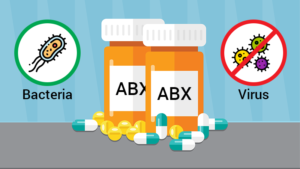
Antibiotic resistance. In the U. S., a third of antibiotic prescriptions are deemed unnecessary. Nearly 80% of all antibiotics are given to animals for faster growth rate and increased size.
It’s a worldwide problem, but one that can be solved.
Scientists at Oxford University are tackling the severe threats of bacterial resistance with a dedicated research institute to address “overuse and misuse” of antibiotics. Dr. David Sweetnam, a surgeon advising the new institute, claims that health-related antimicrobial resistance is one of the most under-reported issues of our time. Without efforts to mitigate current usage, 10 million annual deaths are projected by 2050.
Here’s the good news.
Educational campaigns dramatically reduced smoking and they can do the same to reverse antibiotic overuse. Clinicians and other health advocates can take the lead in explaining the health, social, and economic benefits of conscious consumption and responsibly-sourced animal products. Changing prescribing routines, purchasing decisions, and consumer food choices will also substantially reduce the health issues related to antibiotic resistance.
What can we all do?
Antibiotic resistance. In the U. S., a third of antibiotic prescriptions are deemed unnecessary. Nearly 80% of all antibiotics are given to animals for faster growth rate and increased size.
It’s a worldwide problem, but one that can be solved.
Scientists at Oxford University are tackling the severe threats of bacterial resistance with a dedicated research institute to address “overuse and misuse” of antibiotics. Dr. David Sweetnam, a surgeon advising the new institute, claims that health-related antimicrobial resistance is one of the most under-reported issues of our time. Without efforts to mitigate current usage, 10 million annual deaths are projected by 2050.
Here’s the good news.
Educational campaigns dramatically reduced smoking and they can do the same to reverse antibiotic overuse. Clinicians and other health advocates can take the lead in explaining the health, social, and economic benefits of conscious consumption and responsibly-sourced animal products. Changing prescribing routines, purchasing decisions, and consumer food choices will also substantially reduce the health issues related to antibiotic resistance.
What can we all do?